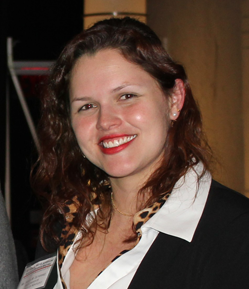Superfund Research Program
Angela Gutierrez is the 20th recipient of the Karen Wetterhahn Memorial Award. The award, which annually recognizes one outstanding SRP graduate student or postdoctoral researcher who exemplifies qualities of scientific excellence, was presented December 7 at the Superfund Research Program (SRP) 30th Anniversary Annual Meeting in Philadelphia.
Gutierrez, who is pursuing her Ph.D. at the University of Kentucky, was recognized for her innovative research focused on developing magnetic nanoparticles coated with plant-derived polymers, called polyphenols, to capture and remove polychlorinated biphenyls (PCBs) from water.

"The Superfund Research Program has provided me with diverse academic training as a scientist. It has fostered my passion in helping younger generations maintain their scientific curiosity and allowed me to grow as an academic researcher," said Gutierrez.
“There is a growing need for environmentally friendly technologies for water and wastewater treatment that can simultaneously meet global water demands and be used in low-resource settings,” Gutierrez said. “Having been born and raised in Colombia, a developing country, this research has personal significance for me. This remediation technology maintains low production costs and is reusable, allowing it to be easily applied in current Superfund sites, as well as in low-resource developing countries.”
The technology developed by Gutierrez and colleagues uses environmentally friendly and reusable nanomaterials that can selectively bind PCBs from contaminated water sources. The platform combines magnetic iron oxide nanoparticles, which are synthesized in the laboratory, with naturally occurring polyphenols found in a variety of plants, such as green tea and berries. These polyphenols can easily bind to organic contaminants like PCBs, removing them from the water. Together this platform costs significantly less than traditional remediation methods and maximizes the reusable lifecycle of the materials. The technology can be easily applied, and no extensive training or excessive added cost is required.
“Angela is keenly interested in making sure the developments in the lab match stakeholders’ needs and can be applied not only in Kentucky, but around the world,” noted University of Kentucky SRP Center Director Bernhard Hennig, Ph.D. “She is also a true role model for her peers. She consistently demonstrates a passion for helping the next generation of scientific researchers and is dedicated to sharing her knowledge with everyone.”
Outside of the lab, Gutierrez is actively involved in scientific communication and outreach. In addition to mentoring undergraduate students in the lab, she has been involved in several programs working with children to promote interest in science, technology, engineering, and mathematics (STEM). She strives to be a positive role model for the future generation, particularly for young women of Hispanic descent, who are underrepresented in STEM fields.
“I hope to help form the next generation of researchers that can tackle the challenges of hazardous waste management through interdisciplinary hands-on research and close relationships with local and national stakeholders,” Gutierrez said.
Gutierrez plans to continue her work in environmental remediation as an academic researcher and hopes to follow in Wetterhahn’s footsteps by using holistic approaches to public health needs.
“I have always been interested in finding ways to make engineering and scientific discoveries more accessible to the wider public,” Gutierrez said. “My long-term goal is to translate my learning experience as a basic researcher to meet stakeholder needs in developing countries and to help provide low-cost and environmentally friendly water treatment facilities that positively impact our communities.”
NIEHS congratulates Gutierrez on her accomplishments and wishes her continued success in her scientific career.


